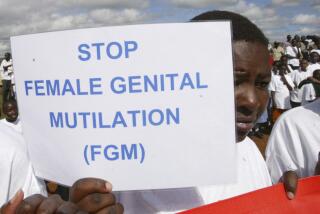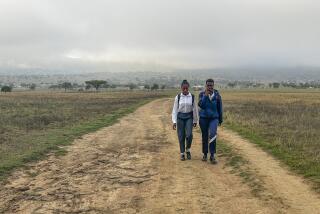Boys hoping to gain their manhood lose it — forever
- Share via
Reporting from Libode, South Africa — In the windblown hills of the Eastern Cape, boys from the Xhosa tribe are in a hurry to be men.
At 20, Siphelele Zweni was ridiculed in his village. They called him nofontyela, a non-man, who’d gone too long without his coming-of-age circumcision.
But when it did take place, Zweni’s circumcision and initiation was like a sadistic scene from “Lord of the Flies.” It cost him, literally, the very thing he yearned for: his manhood.
“They taught me about being a man, but it was hell,” says Zweni, defying a taboo about speaking out against the ritual, which in the Xhosa tribe traditionally had occurred when men were about 20.
But early in the last century, the traditional ways were lost in some areas as local rulers stopped circumcisions. The practice was revived in the 1980s and 1990s, and now younger and younger boys are desperate to have it done so they won’t be nofontyela.
Swayed by the peer pressure, Zweni would have had his operation earlier but for the lack of traditional surgeons, who had disappeared during those long years of no circumcisions.
Medical research has shown that circumcision sharply reduces the spread of HIV and other diseases. Hospital circumcisions are reviled in the Eastern Cape, however, leading young men to undergo dangerous bush procedures, often at the hands of con men, who pretend they know the traditional ways, or inexperienced teenagers.
The problem is that, in taking over a procedure traditionally done by elders, the young ones aren’t doing it right. Alien new practices have crept in to the “initiation”: severe beatings, harassment and a dangerous ritual of tightening the dressings on boys’ wounds.
Boys as young as 13 are circumcised. Many live in single-parent households where the mothers have no say on the procedure.
A law banning bush circumcisions hasn’t helped. Thirty-seven have died in Eastern Cape province this year; others, like Zweni, have lost all or part of their penises. More than 400 boys have died in the province since 1994, according to government health figures.
“More than a hundred years ago, this custom was stopped by the King of Pondos,” says Nkosi Ngangomhlaba Matanzima, chairman of the Eastern Cape House of Traditional Leaders. “Now, because children are mixing with other tribes at school who practice this custom, young ones all of a sudden take this upon themselves.”
Zweni’s village, Mompondosemi, lies in one of the poorest regions of South Africa, with high unemployment. The skies are gray with the smoke of winter fires. Tiny houses, pink, blue, yellow and green, dot the golden hilltops like cake sprinkles.
They call the coming-of-age initiation “going to the mountain.”
Xhosa boys retreat to huts in the wild for a month to become men. They’re told how to behave, respect their elders, treat women, and conquer fear and loneliness. They’re ordered to make submissive gestures when any circumcised man enters the hut.
Naked but for a blanket in the freezing Southern Hemisphere winter, they get no water, just dry food, for the first eight days after circumcision. Groups of boys are cut with one kitchen knife, potentially spreading HIV infection.
One part of the ritual — the binding of the penis after circumcision — is described by survivors as like torture. Initiated “men,” many of them young teens, repeatedly bound Zweni’s penis tightly. When one group had finished, another arrived. It went on day and night. Crying or protest meant failure as a man.
Enduring the pain of the cut is an important sign of manhood, but easy to bear, Zweni said, compared to what came later. “It was very tight. They were just doing it tight without explaining why,” he says. “All I can tell you is it was very painful and I was very weak. I lost a lot of blood.”
None of this, according to elders, is central to the original ceremony, but is a corruption of the traditional practice of applying herbs and leaves to prevent infection.
Another initiate, Lucky Dikiso, 18, forced open the door of the locked initiation hut and fled after four agonizing days at the hands of 23 circumcised men.
“I was defenseless,” he says. “They would leave and within a few minutes another group would come and do the same thing. They tightened it so tightly, I can’t even describe it.”
Zweni, a herder, was desperate to prove his manhood. “When you go around the village, almost every circumcised man will ask, ‘When you are going to be circumcised?’ and they will chase you away. I was isolated and told they wouldn’t mix with me as an uncircumcised boy,” he says. At important festivals, men would get meat and beer, but not boys.
“There was this anger inside me. I felt their disrespect.”
There was no traditional surgeon, so he and 13 other boys approached an old man in the village who they’d been told was doing circumcisions. He agreed to perform the procedure, but the initiated boys did the rest.
“No one looked after us,” Zweni says, speaking hesitantly in a ward at St. Barnabas Hospital in the town of Libode, nervously fiddling with his left sock. About 30 victims of botched circumcisions fill the men’s wards.
The boys huddle together, nudging, whispering, teasing and laughing. In blue pajamas and aquamarine robes, they’re more like children at bedtime than patients. Only the bloodstains at the crotches of their pajamas betray the tragic undercurrent of their friendships.
Dikiso, who didn’t sustain permanent damage, gazes sympathetically at a new patient who is sweating and feverish, legs splayed uncomfortably. Another boy, soaking his sheet with perspiration, jumps up yelling, believing he’s still in an initiation hut in the wild.
Just being in the hospital — tended by female nurses — means failure. (Women are supposed to have no part in the manhood ritual.)
Back home, once released from the hospital, the boys won’t be accepted as men. They will always be nofontyela, because they failed the ritual.
To gain acceptance, some go back to the “mountain” to be circumcised again after leaving the hospital. But not Dikiso.
“What they’ve done to me is punishment enough,” he says.
The ward is filled with denial more than grief. Lolling on one of the beds, three giggling shy boys, ages 13 and 14, don’t understand that the organs won’t grow back.
Zweni thinks he’ll be released any day, without lasting damage. He does not understand that doctors are keeping him in to allow the rest of the gangrenous flesh to fall off.
He says he will never let his son be circumcised in the bush.
It hasn’t yet sunken in: He probably won’t ever have a son.
robyn.dixon@latimes.com
Pienaar is a special correspondent.
More to Read
Sign up for Essential California
The most important California stories and recommendations in your inbox every morning.
You may occasionally receive promotional content from the Los Angeles Times.











